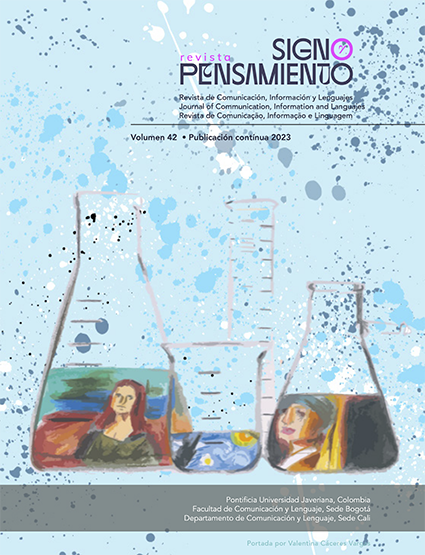Resumen
A partir de la teoría matemática de la información (TMI) de Shannon y algunas sugerencias de Luciano Floridi en torno a los desafíos de la revolución tecnológica, este artículo indaga los efectos epistémicos de entornos redundantes. Para lograr aquel propósito, se revisan los conceptos de información y redundancia de la TMI que luego se relaciona con la figura literaria del cuervo de Poe. En primera instancia, se expone la TMI y se analiza la información en tanto su transmisibilidad. A continuación, se reconfigura el problema de la información en el contexto de algoritmos de plataformas digitales y se vincula la personalización del contenido con la redundancia. Después, se proponen los conceptos de espacios poco informativos y de espacios epistémicamente redundantes para dar cuenta de las condiciones de homogeneidad generadas por entornos hiperpersonalizados. Finalmente, se realiza una pequeña propuesta en torno a la medición de la redundancia.
Bächtiger, A., Dryzek, J. y Mansbridge, J. (2018). Deliberative Democracy: An Introduction. En A. Bächtiger (ed.), The Oxford Handbook of Deliberative Democracy (pp. 1-32). Oxford Academics. https://doi.org/10.1093/oxfordhb/9780198747369.013.50
Bozdag, E. (2013). Bias in algorithmic filtering and personalization. Ethics and Information Technology, 15, 209-227. https://doi.org/10.1007/s10676-013-9321-6
Chibey, T. y Silva, J. (2021). Virtudes y vicios epistémicos: una mirada desde la epistemología social a la información y la participación ciudadana en los medios digitales. THÉMATA. Revista De Filosofía, (64), 79-101. https://doi.org/10.12795/themata.2021.i64.04
De Brasi, L. (2017). Knowledge as a social kind. Unisinos Journal of Philosophy, 18(3), 130-139.
Dourish, P. (2016). Algorithms and their others: Algorithmic culture in context. Big Data & Society, 3(2), 1-11. https://doi.org/10.1177/2053951716665128
Du, S. y Gregory, S. (2016). The Echo Chamber Effect in Twitter: does community polarization increase? En H. Cherifi, S. Gaito, W. Quattrociocchi y A. Sala (eds.), Complex Networks and their Applications V, Complex Networks (pp 373-378). Springer. https://doi.org/10.1007/978-3-319-50901-3_30
Estlund, D. y Landemore, H. (2018). The Epistemic Value of Democratic Deliberation. En A. Bächtiger (ed.), The Oxford Handbook of Deliberative Democracy (pp. 113-131). Oxford Academics.
Floridi, L. (2010). Information: a very short introduction. Oxford University Press.
Floridi, L. (2011). The philosophy of information. Oxford University Press.
Floridi, L. (2014). The fourth revolution. Oxford University Press.
Floridi, L. (2015). The Onlife Manifesto. En L. Floridi (ed.), The Onlife Manifesto Being Human in a Hyperconnected Era (pp. 7-16). Springer.
Goldman, I. A. (2020). The what, why, and how of social epistemology. En M. Fricker, P. J. Graham, D. Henderson y J. N. Pedersen (eds.), The Routledge Handbook of Social Epistemology (pp. 10-20). Routledge .
Gurevich, Y. (2011). What is an algorithm? Microsoft Research.
Habegger, B., Hasan, O., Brunie, L., Bennani, N., Kosh, H. y Damiani, E. (2014). Personalization vs. Privacy in Big Data Analysis. International Journal of Big Data, 25-35.
Hendricks, V. y Hansen, P. (2016). Infostorm. Copernicus Books.
Kian, E. M., Clavio, G., Vicent, J. y Shaw, S. D. (2011). Homophobic and Sexist yet Uncontested: Examining Football Fan Postings on Internet Message Boards. Journal of Homosexuality, 58(5), 680-699. https://doi.org/10.1080/00918369.2011.563672
Makombe, R., Sinyode, B., Tladi, M. y Thambo, S. (2020). Affective economies of racism on social media: a critical analysis of selected South African white supremacist Facebook pages. Communicare. Journal for Communication Sciences in Southern Africa, 39(2), 75-92. https://journals.co.za/doi/epdf/10.10520/ejc-comcare-v39-n2-a4
Micheli, M., Lutz, C. y Büchi, M. (2018). Digital footprints: an emerging dimension of digital inequality. Journal of Information, Communication and Ethics in Society, 16(3), 242-251. https://doi.org/10.1108/JICES-02-2018-0014
Morales, U. R. (2018). El ciudadano digital. Fake news y posverdad en la era de Internet. Océano.
Nouri, L., Lorenzo-Dus, N. y Watkin, A.-L. (2021). Impacts of Radical Right Groups’ Movements across Social Media Platforms - A Case Study of Changes to Britain First’s Visual Strategy in Its Removal from Facebook to Gab. Studies in Conflict & Terrorism, 1-27. https://doi.org/10.1080/1057610X.2020.1866737
Paglen, T. (2019). Imágenes invisibles. laFuga. https://lafuga.cl/imagenes-invisibles/944
Pariser, E. (2011). The Filter Bubble. The Penguin Press.
Poe, E. A. (1884). The Raven. Harper & Brothers.
Powers, E. (2017). My News Feed is Filtered? Awareness of news personalization among college students. Digital Journalism, 5(10), 1315-1335.
Rodríguez, P. (2012). Historia de la información. Capital Intelectual.
Rodríguez, P. (2019). Las palabras en las cosas. Saber, poder y subjetivación entre algoritmos y biomoléculas. Cactus.
Rolin, K. (2020). The Epistemic Significance of Diversity. En M. Fricker, P. J. Graham, D. Henderson y J. N. Pedersen, The Routledge Handbook of Social Epistemology (pp. 158-166). Routledge.
Rooney, T. (2015). Shame and the virtual gaze: Supporting children’s encounters in online worlds. Emotion, Space and Society, 16, 21-27. https://doi.org/10.1016/j.emospa.2015.06.003
Shannon, C. E. y Weaver, W. (1949). The Mathematical theory of communication. The University of Illinois Press.
Smith, G. y Setälä, M. (2019). Mini-Publics an Deliberative Democracy. En A. Bachtiger, J. Dryzek, J. Mansbridge y M. Warren (eds.), The Oxford Handbook of Deliberative Democracy (pp. 1-8). Oxford University Press.
Sunstein, C. R. (2017). #Republic. Divided Democracy in the Age of Social Media. Princeton University Press.

Esta obra está bajo una licencia internacional Creative Commons Atribución 4.0.
Derechos de autor 2024 Tamara Jesús Chibey Rivas, Jorge Francisco Silva


